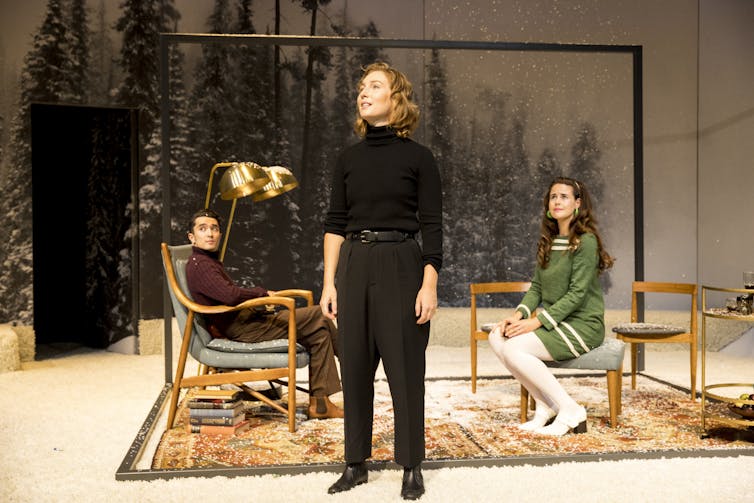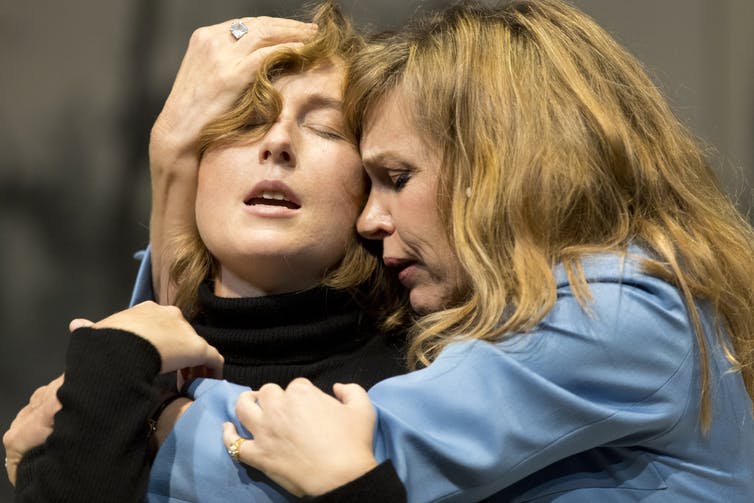Review: Hamlet, directed by Peter Evans.
In a speech to the United Kingdom’s House of Commons on March 9, Ukrainian President Volodymyr Zelensky quoted Shakespeare’s Hamlet:
The question for us now is to be or not to be. Oh no, this Shakespeare question. For 13 days this question could have been asked, but now I can give you a definitive answer. It’s definitely yes, to be.
That Bell Shakespeare’s production of Hamlet – a domestic revenge tragedy set against the larger political backdrop of Denmark’s invasion by its neighbour, Norway – re-opened after two years of COVID delay on the day Zelensky made this speech is an extraordinary coincidence.
When originally mounting this production two years ago, director Peter Evans could not have foreseen the peculiar timeliness of this Hamlet. But, as Hamlet tells Polonius, actors “are the abstract and brief chronicles of the time”.
More sorrow than anger
Alongside reflecting global politics, this stylish and understated production plays upon the melancholy prince’s youthfulness and his emotional sensitivity.
As Hamlet, Harriet Gordon-Anderson continues a 300-year tradition of women playing Hamlet. The first recorded female Hamlet was Charlotte Clarke’s London performance in the early 18th century.
The French actress Sarah Bernhardt, the first female Hamlet on film in 1900, said the prince had to be played by a woman:
I cannot see Hamlet as a man. The things Hamlet says, his impulses, his actions, all indicate to me that he was a woman.
This perception of Hamlet’s femininity is not so much produced by his initial distaste for violence and inability to avenge his father’s murder, but by his unrestrained mourning for his losses.

Hamlet’s “fruitful river of the eye” – his crying – is mentioned at several points in the text. Disturbed by his nephew’s tears, the murderer King Claudius tells Hamlet “‘tis unmanly grief” to weep for those lost.
Hamlet’s copious weeping goes beyond the bounds of acceptable masculinity. Perhaps it is only with a female Hamlet that the intensity of the prince’s tears can be depicted.
In her bravura portrayal of the melancholy prince, Gordon-Anderson is unafraid to show Hamlet’s sensitivity. Delivering soliloquies directly to the audience, Gordon-Anderson plays Hamlet as an extraordinarily emotional young man. This Hamlet is acting more in sorrow than in anger, crying freely and wiping his eyes.
The performance is disturbingly realistic. How else should one respond to their father’s murder and their mother’s marriage to their uncle?
A youthful production
This Hamlet highlights the love and loss shared by two families. Besides playing Hamlet as the text directs – at various points tearful and manic – what is also remarkable about Gordon-Anderson’s prince is his youthfulness.
Unlike most staging and films of Hamlet, the young characters in Bell Shakespeare’s production are performed by people in their 20s, rather than actors in their 30s or 40s.

This youthful casting gives the production a sense of domestic realism many others lack.
Throughout the text the characters are keen to point out how “young” the prince, Laertes, Ophelia, Rosencrantz and Guildenstern all are. When we first meet Hamlet, he is in the midst of his university degree.
As the foil to Hamlet, “the very noble youth” Laertes is equally young, and is played by Jack Crumlin with a brash, boyish energy. Rose Riley plays Ophelia as a sassy and self-aware young woman who rolls her eyes at Polonius’ moralising.
The older Polonius is touchingly played by Robert Menzies: he does not appear as a conniving political operator, but instead as a naïve and tender old father.
The performances make the characters feel like people we know, rather than legendary, tragic characters from a faraway world.

But while this realism is refreshing – and what draws the audience to connect with the characters – paradoxically, these performances make the revenge at the play’s core seem somewhat unrealistic. It is difficult to believe these gentle and sensitive-seeming characters could commit a series of murders.
Evans’s Hamlet is more interested in claustrophobic personal dynamics than the terror of invading forces that concludes the play. But it is a testament to this production’s power that it can make the audience reflect on the world beyond while witnessing personal, familial breakdowns.
“The time is out of joint”, Hamlet tells the audience. Not so for this most timely production.
Bell Shakespeare’s Hamlet plays at the Sydney Opera House until April 2, before touring to Canberra and Melbourne.
Gabriella Edelstein, Lecturer in English, University of Newcastle
This article is republished from The Conversation under a Creative Commons license. Read the original article.
Bell Shakespeare’s production of Hamlet continues at Canberra Theatre until 16 April.
Get all the latest Canberra news, sport, entertainment, lifestyle, competitions and more delivered straight to your inbox with the Canberra Daily Daily Newsletter. Sign up here.



